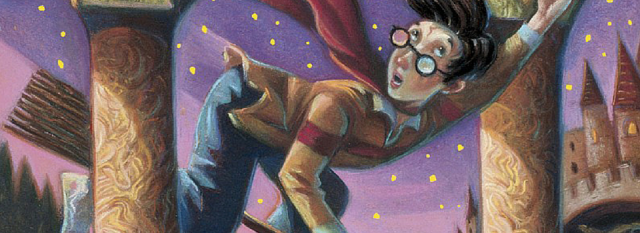“It is a monstrous thing, to slay a unicorn…. Only one who has nothing to lose, and everything to gain, would commit such a crime. The blood of a unicorn will keep you alive, even if you are an inch from death, but at a terrible price. You have slain something pure and defenseless to save yourself, and you will have but a half-life, a cursed life, from the moment the blood touches your lips” (258).
Atonement themes resound through this passage—death, crime, blood, life, price, purity, salvation and curse to name but a few. Reorganize these words slightly and you have the Gospel message. But the “slight” matters immensely, for what we have here is an evil grasp at a desperate and demonic salvation. Augustine teaches us that any good thing can be corrupted or perverted, and we find that powerfully affirmed here in the first of Rowling’s series: Christ’s atonement, as good and beautiful an action as can be found in all of creation, can also be corrupted and disastrously perverted. All the same elements are present, all the same ingredients factor in, but something is wrong and deeply perverse.
Offering and Grasping
And the “something,” it turns out, is the subtle change from “offering” to “grasping.” Christ had everything to lose, nothing to gain, and offers that which was pure in taking upon himself the curse. We find Voldemort paying a similarly horrible price in order to cling to life at all costs. He defiles himself with purity, slays to live and brings the blood to his lips rather than offering it to others in the form of the Eucharist. It becomes an atonement, a pseudo-salvation which reeks of death (Vol–de-mort: “full of death”) and the mere semblance of life parodying the life-giving work of Christ.
It’s not as though Rowling only grasped the dark side of Christ’s work, for the logic of self-sacrifice exudes throughout the concluding chapters of the book. Ron, for instance, sacrifices himself to move Harry and Hermione onward in reaching the Sorcerer’s Stone: “That’s chess… You’ve got to make some sacrifices” (283). Earlier, Neville had made a similar sacrifice, which was beautifully honored by Dumbledore in the year-end banquet, tipping the house competition in favor of Gryffindor.
The Logic of Sacrifice
The most powerful manifestation of this sacrificial logic, however, occurs in Dumbledore’s brief account the infant Harry’s survival at the hands of Voldemort:
“If there is one thing Voldemort cannot understand, it is love. He didn’t realize that love as powerful as your mother’s for you leaves its own mark. Not a scar, no visible sign.…to have been loved so deeply, even though the person who loved us is gone, will give us some protection forever. It is in your very skin. Quirrell, full of hatred, greed, and ambition, sharing his soul with Voldemort, could not touch you for this reason. It was agony to touch a person marked by something so good” (299).
In this, we find the beginnings of something truly great, truly beautiful, in terms of a theology of the atonement in Rowling’s works. Voldemort enacts a demonic pseudo-atonement; Ron, Hermoine and Neville give us a glimpse at what the logic of atonement looks like as we take up our crosses in loving our friends, but the sacrificial love of Harry’s mother takes us further still—deep into the heart and metaphysics of love.
When Harry’s mother died for him, several things happened, but most importantly, according to Dumbledore, something changed—and changed permanently. Harry’s mother did not merely absorb Voldemort’s curse, or something of the sort. Such an act might be substitutionary, but it would not protect Harry in the future. Something deeper, more powerful still, happened: “love as powerful as your mother’s for you leaves its own mark …to have been loved so deeply…will give us some protection forever. It is in your very skin.” As Rowling envisions it, love is powerfully effective, not merely in the moment, but leaves a permanent mark, weaving itself into the very fabric of our being, so that we become more than we might otherwise appear.
What it means for Harry to be himself is for him to be bound up in and protected by the love of his mother. Bonds are forged by this sacrificial love, which weave themselves into our very skin. Love, in this sense, is no mere emotion, no mere motivation for certain kinds of action; rather, self-sacrificial love is a powerful and effective reality, fundamentally changing the object of its action. Those saturated and protected by this force participate in a power greater than evil and its schemes. The full elaboration of this vision waits further unpacking in the later volumes of the series, but already in the first book we are confronted with a tale of atonement, in which a profound logic of participatory love pushes us to new heights of appreciating what the work of Christ for us might mean and entail.
Identity and Atonement
Rowling’s world is one in which people can be who they are, and more still. A close examination of Harry, even his own self-understanding, don’t come close to the full reality—for he is what he is in relation to the love of his mother which has saturated his being, including his very skin. It is this thesis concerning identity—that we can bind our identity to that of others, or other things, which constitutes the deepest and most provocative insight in this book (and the series as a whole) for thinking through how Christ’s work can touch us, so many centuries later. The love of Christ, Rowling might say, leaves its mark on us, weaving into the very fabric of our being.
